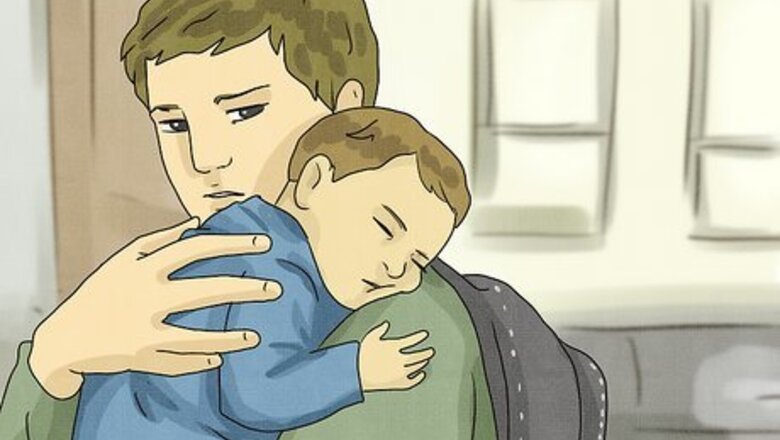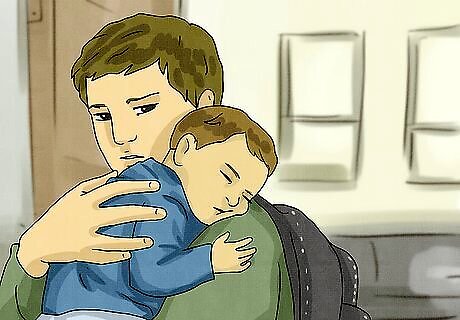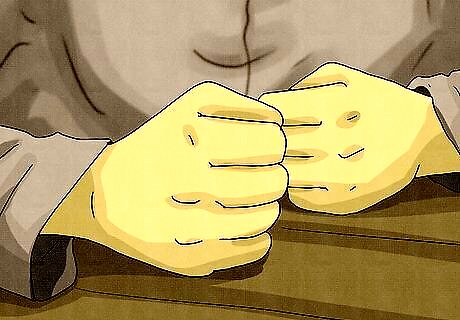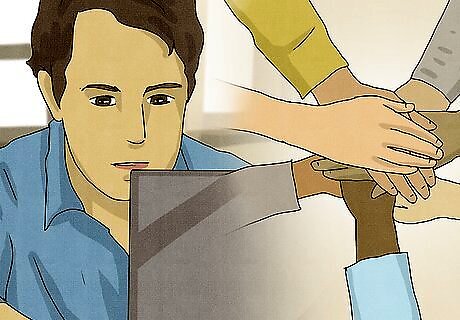
views
Protecting Yourself (and Others) from a Violent Partner

Establish safety first. If your spouse acts violently towards you or anyone else in the home, the first thing you need to do is get yourself (and any other innocents) to a safe place. This may be a locked room somewhere else in your home, a neighbor's house, another family member's home or your local police station. If she comes at you, try to shield yourself from harm as much as possible without retaliating as this can cause you to be considered a perpetrator, too. If you have children in the home, alert them to head to your "safety zone" whenever shouting or other signs of violent behavior takes place. If you believe you are in danger, call the emergency services immediately.

Confide in someone you trust. The first step in getting out of a potentially harmful situation is often just letting others know you are in an abusive relationship and you need support and help. Beyond telling someone you trust, it can be helpful to ask them to assist in helping you find a way to leave. You generally need to gather resources, copies of documents and other items as you prepare to leave. A trusted friend can store these items for you. Gather any items you may need to leave like your own cell phone, a separate bank account and legal ID so you are not forced to stay in the home.

Leave the relationship or home if you can. Research your options as far as filing for separation, custody and other legal matters so you can coordinate as needed. If there are children in the home, make a plan for all of you to leave safely, if possible. This plan needs to take into account local laws about custody and what needs to occur so you can take the children with you if that is what you want. Because abuse often follows the same cycle, you may be able to time leaving during a time where your partner thinks everything is “normal” and perhaps less likely to think something is going to happen. If you have to leave during the active abuse, beware this is the time you are most likely to be faced with possible false charges of you being the abuser, or even of getting hurt. Reader Poll: We asked 272 wikiHow readers who’ve been victims of abuse, and 65% agreed that in order to maintain safe boundaries, it's important to block your ex’s number and social media accounts after leaving the relationship. [Take Poll]

Document any offenses. You need to protect yourself from retaliation in the form of false charges of abuse from your partner; keeping records of everything will help in this case. If you keep a journal or other documentation, make sure you give a copy of it to a friend for safe keeping outside of the home. You might document the abuse by photographing injuries you or others sustain, having others write down testimony to what they witness, or keeping a journal with dates, times, and details of what happened. In order for this to be considered documentation of abuse, you must refrain from expressing opinions or making judgments. Stick to the facts.

Refrain from getting revenge. This may actually be exactly what she is trying to push you to do. In some abusive relationships, a female abuser may attempt to push her partner to the point of reacting violently or seeking revenge. Depending on local laws, this kind of action could end up with you being in jail. Documenting and not reacting to abuse is much safer for you in the long run, no matter how tempting retaliation may be.

Reach out to a domestic violence support program. Men are far less likely to report abuse because they are isolated into thinking they are alone. Women in same sex relationships can be victims of domestic abuse too. Seeking help and support can show you just how common it may be. Look up shelters, assistance programs, and other forms of support in your area.

Consider making a safety plan for when you leave. An action plan helps you prepare for all probabilities when you finally decide to leave the home. This plan would not only include what your actions need to be but also letting those close to you know what is going on as well. Your family, for example, should know if you are leaving with your children and what to do if your partner calls looking for you. Many support programs have resources that can help prepare and support a safety plan. This includes setting up secure mailing addresses so the abuser does not know where you have gone and other formal ways to protect yourself.
Knowing Your Rights

Understand violence against men statistics, if you are a man. Men are abused in about 10% of homes but often this abuse goes unreported. Men who are abused come from a variety of backgrounds, sexual orientations and living situations. Female abusers are far more likely to use control or emotional abuse against male partners than the reverse.

Consult with a family lawyer if you have children. It is wrong to assume the mother always gets the children—if you want your children with you, fight for them. In most states and some other locations, you can file for an emergency order that would allow you to take any vulnerable children with you if you can provide proof that this is a better solution than staying with their mother. There's a myth that the mother will automatically get custody. In fact, when fathers ask for custody, they often get it. (This includes situations in which there was no abuse.) Don't give up. You have a good chance. In general you have the right in most states to leave the home, but if you are married there may be legal things you need to do to set up the legal separation and custody. Without taking legal steps, you may not have the right to simply leave with the children. You should be informed about the legal issues you face to avoid further threats or manipulation by your partner.

Learn how your area handles these cases. If you have sought out local support, many times these groups will have information about local law enforcement and laws. It is in your best interest to work with the legal system. They can assist with things like serving divorce papers or even a restraining order if you require one. Taking steps to quietly line up service right after you leave the home can help to avoid a bigger issue in front of children.
Identifying Domestic Violence

Consider how your partner talks to you. Abuse from a partner can come in several forms beyond the physical abuse many people often think of when hearing the term domestic abuse. Your partner’s verbal interactions with you would be considered abusive if she: Calls you names, insults you or belittles you Blames any outburst on you and says you deserve to be treated this way Intimidates you into not seeing family or friends by yelling or making threats Turns the blame on you whenever you try to bring up a problem (For example, you try to tell her that she's hurt your feelings, and somehow you end up being the one apologizing) Belittles you by accusing you of being gay or unable to perform sexually in front of others to hurt you Engages in behaviors that attempt to isolate you and keep what happens at home a secret

Notice gaslighting. In gaslighting, your partner manipulates you to try to get you to doubt your own sanity, and rely on her for knowing what is and isn't real. She may accuse you of making things up or overreacting, and try to make you believe that you can't tell fact from fiction. Saying "I never said/did that" or "that never happened" Moving things around, and denying that anything has changed Telling you to stop overreacting when you mention a problem Calling you crazy or a liar (She may also say this about you to other people, to try to make them not listen to you)

Question whether your girlfriend or wife is threatening you. Threatening behaviors can be very subtle or in-your-face obvious. The threat may be physical, emotionally-based or tied to sex. Examples of behaviors that would be considered threatening would include: Telling you if you try to leave she will call the police to have you arrested for domestic violence or some other sort of crime you did not commit. Using your fear of losing contact with your kids to keep you in the home by telling you that you will never see your kids again if you act in a way she does not like. Not allowing you to have contact with your family or friends unless you agree to her demands or cover up arguments you have had. Threatening to harm herself or someone else if you leave/disobey her.

Think about whether your partner often tries to control you. Controlling another adult can be another form of abuse. Examples of behaviors that would be considered controlling would include: Limiting your access to the phone or other communication with the outside world to the point that everything goes through your partner. This may also include tracking and monitoring your cell phone bill and demanding free access to email accounts as well. Becoming jealous and over-reacting about even meaningless contact with other women in public or incidental contact with co-workers. This outrage can be used as a way for her to justify hurting you physically or emotionally. You feeling like you are always walking on egg shells because she may explode at any time Manipulating you into staying in a bad relationship by threatening to harm or kill herself Taking control of the household funds to the extent that you are not able to buy things for yourself without her approval or you are forced to give her access to all the money you make working (without your consent)

Think about whether your partner has ever struck you physically. Whether or not you are bigger than her does not matter, if she has hit you then that can be considered abuse. Many men feel like they have to just take being hit by a female partner without reacting because a man should never hit a woman. This can be used as a part of the manipulation. Depending on local laws, a woman hitting a man may be treated differently than the opposite happening. This can be used as a threat to keep the secret. For example, she may tell you if you call the police, it is the man who is always arrested. Striking does not always mean hitting. It is also physical abuse if your partner pushes, kicks, trips, or otherwise physically hurts you. It includes using an object as a weapon, such as throwing a glass at you, or hitting you with a belt. If your partner misses on purpose, intending to scare you into submission, this is still abuse.

Know that abuse can be carried out sexually, too. Statistically women are more likely than men to use sex as a way to control their partner’s behaviors. Unfortunately, this is also a kind of abuse. Your partner might withhold sex (as a punishment) or threaten false accusations of sexual misconduct as well. Sex may also be a form of abuse if she uses it as a way to humiliate or emasculate you. This would include touching you in a way that is unwanted, hurting you during sex or forcing you to do something you do not want to do. You should be able to freely say "no" (or a safe word) without worrying how she'll react, and have her respect it, without her getting upset with you for saying no.

Consider if your interactions form a recurring cycle. You do not have to be in a relationship that is always bad to be in an abusive relationship. It is common to have very low times during the abuse followed by times where she is very apologetic and willing to do anything to “win” you back. Many times the best times are in front of family so they may not understand when you start talking about leaving. Consider keeping track of the good and bad interactions so you can establish patterns. Sometimes, in the moment, it is hard to see that you are repeating the same cycle and that the positive behaviors will soon give way to abuse. This cycle of abuse usually follows this pattern: abuse, guilt, excuses, “normal” behavior, fantasy and then build up to the abuse starting again. Knowing the pattern can also help you predict the abuse and start to recognize it as abusive behavior.















Comments
0 comment